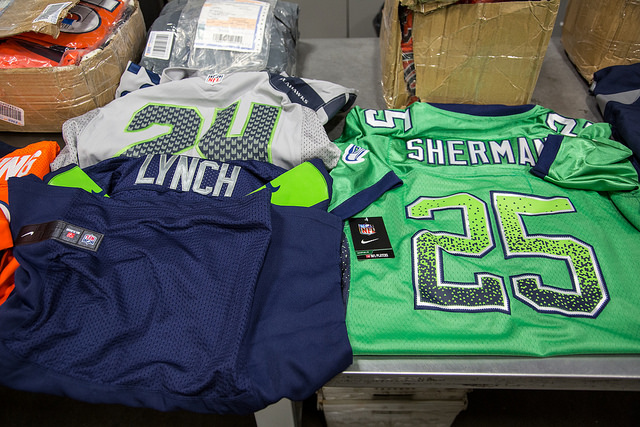DHS: Buying a Super Bowl Jersey? Make Sure It's Not Fake.
Agencies and the NFL partner during Super Bowl week to weed out counterfeit Seahawks and Patriots products.
The Super Bowl is one of the United States' biggest annual cultural events, reportedly bringing in tens of billions of dollars in revenue. Everyone wants in on the money, including a lot of merchandise pirates.
Federal agencies are teaming with the National Football League this year on a law enforcement effort aimed at getting rid of counterfeit sports merchandise and tickets featuring the NFL and its flagship event.
According to a National Intellectual Property Rights Coordination Center release, Immigration and Customs Enforcement Director Sarah R. Saldaña, Customs and Border Protection Director of Field Operations William K. Brooks, and NFL Counsel Dolores F. DiBella spoke at the Super Bowl site near Phoenix Thursday of the initiative, dubbed “Operation Team Player.” The operation has been successful at weeding out fake hats, jerseys and pro football merchandise nationwide, they said.

Hundreds of counterfeit NFL jerseys were seized by CBP at the JFK International Mail Facility in New York in January 2014. (Customs and Border Protection photo)
Official NFL merchandise can sell for hundreds of dollars -- and tickets to the event are going for more than $4,000 on the secondary market -- but this is copyrighted material. Fans may see the merchandise as a victimless crime since the NFL is the United States' largest sports league taking in mountains of revenue, but ICE officials say the real victims are those making the merchandise, both here and in the developing world.
“Counterfeiting is not a game,” Saldaña said. “It is most certainly not a victimless crime either. Whether it’s the child in Southeast Asia working in deplorable conditions, or local stores going out of business, intellectual property theft is a very real crime with very real victims. No good comes from counterfeiting American products regardless of whether they are all-star jerseys, airbags or aspirin.”
Beginning after 2014's Super Bowl, the operation targeted shipments of counterfeit merchandise as it entered the United States through ports of entry. The agencies and the NFL identified vendors selling NFL material identified as pirated and shut down as many of the counterfeiters as possible.
NEXT STORY: Bob Dylan is Thinking About the Government







